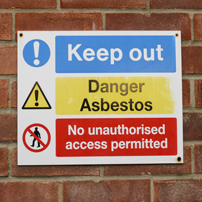MENU
- Home
- Overview
- Attorneys
- Practice Areas
- Firm News
- Blog
- Contact
 Asbestos is a known carcinogen that can cause serious health risks to humans. While asbestos is not usually hazardous in its bonded form, it becomes toxic when the material containing the asbestos becomes worn or damaged. When this happens, the fibers can be released into the air and easily inhaled, causing a range of asbestos-related diseases, including mesothelioma, a potentially fatal type of lung cancer. Prior to 1980, asbestos was used in a wide range of building materials like insulation, flooring, ceiling tiles, and shingles. As a result, many of the homes and buildings that were built before 1980 may contain hazardous asbestos. To protect individuals from the harmful effects of asbestos, a licensed asbestos abatement professional should be hired to safely remove the material from the premises.
Asbestos is a known carcinogen that can cause serious health risks to humans. While asbestos is not usually hazardous in its bonded form, it becomes toxic when the material containing the asbestos becomes worn or damaged. When this happens, the fibers can be released into the air and easily inhaled, causing a range of asbestos-related diseases, including mesothelioma, a potentially fatal type of lung cancer. Prior to 1980, asbestos was used in a wide range of building materials like insulation, flooring, ceiling tiles, and shingles. As a result, many of the homes and buildings that were built before 1980 may contain hazardous asbestos. To protect individuals from the harmful effects of asbestos, a licensed asbestos abatement professional should be hired to safely remove the material from the premises.
When a building is being renovated or demolished, materials containing asbestos are often found, particularly if the building is more than 40 years old. An asbestos removal contractor will examine the property for asbestos fibers and determine whether a Health and Safety Executive (HSE) license is needed to complete the job. HSE’s are required when asbestos fibers are likely to be released into the air during the removal process. The removal contractor is responsible for bringing the equipment needed to safely dispose of the asbestos-containing materials. Make sure that you obtain a copy of the disposal receipt from your contractor and that the following steps are taken when transporting and disposing of the asbestos:
It is against the law to use curbside bins to dispose of asbestos waste, as it can contaminate waste streams, and cause health risks to those who meet it. Penalties for breaking the law include fines of up to $7,500 for individuals and $15,000 for companies. In addition, the individual or company would be responsible for paying additional clean-up and disposal costs if the Environmental Protection Agency or the local council issues a clean-up notice.
If you have been exposed to asbestos, do not hesitate to contact the highly skilled Delaware asbestos lawyers at Jacobs & Crumplar, P.A. Our experienced team will work tirelessly to secure the maximum financial compensation you deserve, while ensuring that your legal rights are protected. To schedule a free, confidential consultation, call us at 302-656-5445 or contact us online today. Our offices are in Wilmington and Georgetown, Delaware, where we represent clients throughout the state.